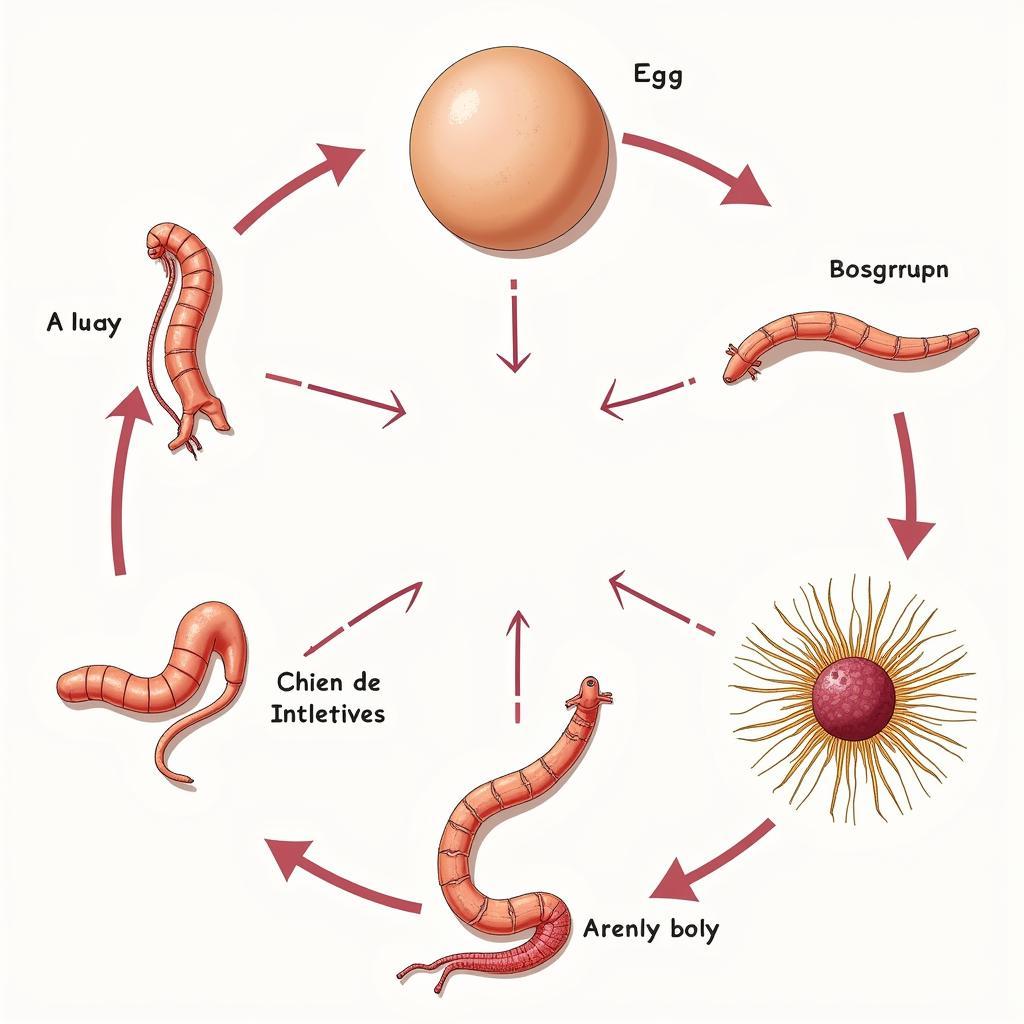Redworm In Horses, also known as Strongylus vulgaris, is a serious parasitic threat that can significantly impact your horse’s health. These parasites inhabit the horse’s large intestine and can cause a range of problems, from mild digestive upset to life-threatening colic. Understanding redworm, its life cycle, and effective prevention and treatment strategies is essential for every horse owner.
Understanding the Redworm Life Cycle
The redworm life cycle is a fascinating yet concerning process that begins with the horse ingesting infected larvae from contaminated pasture. These larvae then migrate through the horse’s body, causing damage along the way. Understanding this cycle is key to effective redworm control.
Larval Migration and Development
Once ingested, redworm larvae burrow into the intestinal wall and begin their migration through the arteries supplying the gut. This migration can disrupt blood flow and cause inflammation, potentially leading to serious complications like colic. After several months, the larvae return to the large intestine to mature into adults and produce eggs, which are then shed in the horse’s manure, continuing the cycle.
 Redworm Life Cycle Diagram
Redworm Life Cycle Diagram
Recognizing the Signs of Redworm Infection
While some horses may show no outward signs of infection, others can exhibit a variety of symptoms, depending on the severity of the infestation. Recognizing these signs is crucial for early diagnosis and treatment.
Common Symptoms of Redworm Infestation
Some common signs of redworm infection include weight loss, poor coat condition, diarrhea, and colic. In severe cases, the horse may develop anemia or other serious health problems. It’s essential to consult a veterinarian if you suspect your horse may have redworm.
Preventing Redworm in Horses
Preventing redworm infestation requires a multifaceted approach that includes regular deworming, pasture management, and good hygiene practices. By implementing these strategies, you can significantly reduce the risk of your horse becoming infected.
Effective Deworming Strategies
Regular deworming is a cornerstone of redworm control. Working with your veterinarian to develop a tailored deworming program based on fecal egg counts and your horse’s individual needs is essential for effective parasite control and minimizing the development of drug resistance. Rotating dewormers with different active ingredients can also help prevent resistance.
Pasture Management Techniques
Maintaining clean pastures is crucial for minimizing redworm exposure. Regularly removing manure, rotating pastures, and avoiding overgrazing can help break the redworm life cycle and reduce the number of infective larvae on the pasture.
Treating Redworm Infections
If your horse is diagnosed with a redworm infection, your veterinarian will recommend an appropriate treatment plan. Following their instructions carefully is essential for successful treatment and preventing reinfection.
Veterinary Treatment Options
Several effective deworming medications are available for treating redworm infections. Your veterinarian will choose the most appropriate dewormer based on the severity of the infection and your horse’s specific needs. They may also recommend supportive care, such as fluids or pain medication, depending on the horse’s condition.
Conclusion
Redworm in horses is a serious concern, but with proper management, it can be effectively controlled. By understanding the redworm life cycle, recognizing the signs of infection, and implementing preventative measures, you can protect your horse’s health and well-being. Regular deworming, pasture management, and prompt veterinary care are essential for minimizing the impact of this parasite. Remember to consult with your veterinarian for a tailored plan to address your horse’s specific needs.
FAQ
- How often should I deworm my horse for redworm?
- What are the most effective dewormers for redworm?
- Can redworm be fatal to horses?
- How can I tell if my horse has redworm?
- What is the best way to manage my pastures to prevent redworm?
- Are some horses more susceptible to redworm than others?
- What should I do if I suspect my horse has redworm?
Need help with horse care? Contact us! Phone: 0772127271, Email: [email protected] or visit us at QGM2+WX2, Vị Trung, Vị Thuỷ, Hậu Giang, Vietnam. We have a 24/7 customer service team.